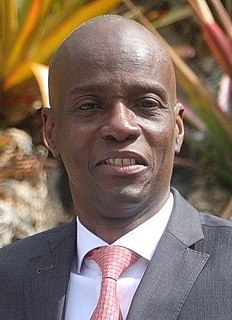A Quote by Jean-Claude Duvalier
Related Quotes
Sometimes people who want to understand Haiti from a political perspective may be missing part of the picture. They also need to look at Haiti from a psychological perspective. Most of the elite suffer from psychogenic amnesia. That means it's not organic amnesia, such as damage caused by brain injury. It's just a matter of psychology.
There is this split between the Haiti of before the earthquake and the Haiti of after the earthquake. So when I'm writing anything set in Haiti now, whether fiction or nonfiction, always in the back of my mind is how people, including some of my own family members, have been affected not just by history and by the present but also by the earthquake.
If you love Black people, why are you destroying Haiti? If you love Black people, why did you, [Hillary] Clinton, stop them from the rice that they were producing in Haiti to feed themselves and other Caribbean nations? You put the rice industry out of business; and now rice is coming from Arkansas, chicken coming from Arkansas, when it once was growing right there in Haiti.
If any country was a mine-shaft canary for the reintroduction of cholera, it was Haiti - and we knew it. And in retrospect, more should have been done to prepare for cholera... which can spread like wildfire in Haiti... This was a big rebuke to all of us working in public health and health care in Haiti.
Even in Haiti, I saw John Wayne movies. American cinema has always been the dominant cinema throughout the world, and people tend to forget that. People aren't just seeing these films in California or Florida. They're seeing them in Haiti, in Congo, in France, in Italy and in Asia. That is the power of Hollywood.










































